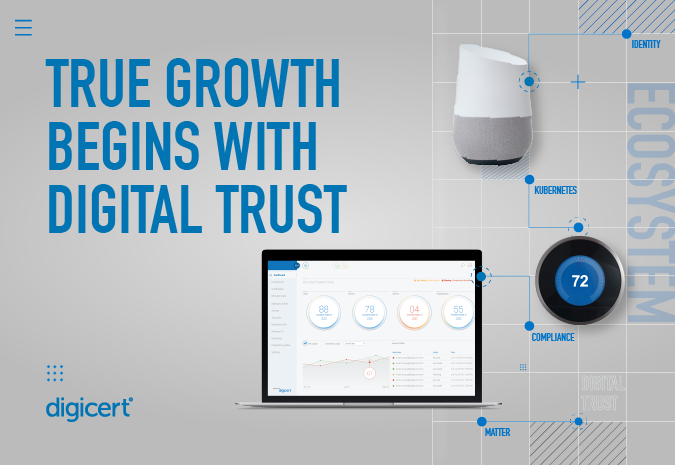
As the digital landscape continues to grow, roles responsible for managing security, compliance, privacy and digital operations have gained significance. However, they have also become more intricate. The roles of the Chief Information Security Officer (CISO) and Chief Security Officer (CSO) have evolved as well. In recognition of this increasing importance, there is a noticeable trend toward the creation of roles primarily dedicated to overseeing digital trust, security and operations.
In 2022, Forrester predicted that the Chief Trust Officer role would organically evolve from the CISO position, and they anticipated that 15 companies within the Global 500 would appoint a Chief Trust Officer in the following year.
As a leading provider of digital trust, DigiCert works to ensure digital trust in the solutions we deploy to our customers. We work with customers in more than 180 countries and are the digital trust provider of choice to the largest cybersecurity firms. DigiCert is invested in standards, compliance and operations, which together set the standard for a comprehensive approach to defining and establishing digital trust. This is why 93% of the top 100 global financial services companies and 88% of the Fortune 500 use DigiCert. Trust is essential in every step, and today I’m sharing a few lessons learned on how to build and maintain digital trust.
Increasing digital trust increases brand trust
The rise of the Chief Trust Officer and other digital trust titles comes as digital trust is becoming increasingly intertwined with not only customer engagement but also adding to (or subtracting from) the bottom line. The average data breach in the United States costs $9.4 million, and the cost of a failed audit is $14 million. Two-thirds of companies have switched vendors after they lost trust in a former vendor while half of consumers have done the same, according to the DigiCert 2022 State of Digital Trust survey.
Additionally, according to Deloitte, trust serves not only as a defensive asset but also as a catalyst for revenue growth. Companies that establish trust outperform their competitors by a remarkable fourfold margin, and an impressive 88% of consumers who have trust in a brand become loyal, repeat customers. As Jeff Pollard, Vice President and Principal Analyst at Forrester, emphasized in a keynote address in 2022, "Trust in technology directly translates into trust in the brand." That’s why we’ve seen a rise in Chief Trust Officers aiming to protect brands, increase consumer trust and, ultimately, grow revenue.
How to build digital trust
Digital trust, or what enables individuals and businesses to engage online with confidence that their footprint in a digital world is secure, is a strategic imperative in today’s world.
Digital trust is about more than a product or service. It is established upon four key building blocks:
- Industry and technology standards that define what constitutes trust.
- Compliance and operations that govern delivery of trust.
- Unified trust management platforms for certificate lifecycle management of public and private trust.
- Extension of trust through ecosystems such as connected devices, software supply chains and digital content provenance.
Building digital trust ties in directly to the duties of a Chief Trust officer.
Duties of a Chief Trust Officer
While various departments within a company deal with aspects of digital trust, they often approach these matters tactically, focusing on specific use cases such as certificate administration. The role of the Chief Trust Officer aims to transform this tactical approach into a strategic one, where they provide comprehensive oversight of all digital trust initiatives. From this vantage point, Chief Trust Officers can establish policies and procedures for the centralized governance of digital trust and risk concerns, which are paramount for contemporary businesses. The Chief Trust Officer is responsible for overseeing the development of digital trust in their products and services.
How DigiCert ensures digital trust
DigiCert is a clear leader in the digital trust market, supporting everything from standards development to extending the digital trust ecosystem.
First, DigiCert actively participates and drives many digital trust standards. We participate in the CA/Browser Forum and are leading initiatives in post quantum cryptography. We were instrumental in the Matter standard and the payment card industry security standards.
Second, we have a very rigorous compliance program, with 25-plus audits every year to make sure that not only are we meeting the Baseline Requirements, but we’re also actually setting the industry benchmark of how you should be compliant and secure against some of these controls.
Third, we are unifying trust management with our leading digital trust solutions. DigiCert ONE®, the platform for digital trust, is based on a modern cloud native infrastructure, using technologies like Kubernetes that enable us to scale easily. DigiCert ONE provides organizations with centralized visibility and control over a broad range of public and private trust needs, securing websites, enterprise access and communication, software, identity, content and devices.
Finally, we are extending trust throughout ecosystems. For instance, we have expanded our Device Trust offerings following the acquisition of Mocana, delivering a comprehensive platform for managing security across the device lifecycle. We have secured more than 3 billion devices globally. Additionally, we added DNS Trust solutions, in conjunction with the acquisition of DNS Made Easy, delivering industry-leading availability and performance for authoritative DNS. We process more than 40 billion DNS queries daily, on average.
In sum, I expect that the Digital Trust Officer position will become increasingly critical to maintain, review and oversee the trust processes within an organization and ensure that customers and partners can continue to use services safely and securely.
If you’re looking to connect with Chief Trust Officers or learn more about building digital trust in your organization, join us at DigiCert Trust Summit, where we will network with other security-minded professionals, explore the future of digital trust, learn about innovative real-world use cases and take a deep dive into today’s most important security topics.







